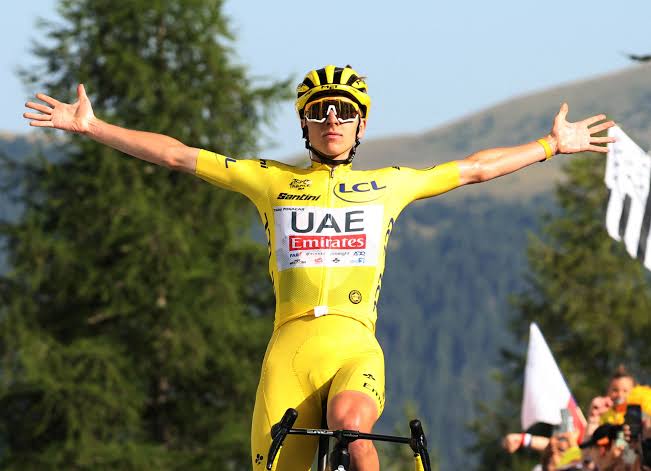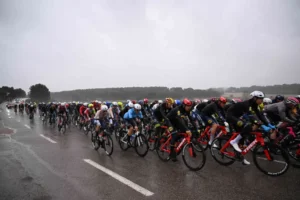
Tadej Pogacar, the Slovenian cycling sensation and two-time Tour de France champion, has officially signed a monumental six-year contract with UAE Team Emirates. This decision, touted by Pogacar himself as a really easy decision,has sent shockwaves throughout the cycling community and sparked intense debate among fans, analysts, and competitors alike. While Pogacar’s commitment is being hailed as a significant milestone for the team, it also raises questions about the long-term implications for both the rider and the sport.
A Show of Loyalty or a Calculated Move?
Pogacar’s announcement comes after a period of speculation regarding his future. As one of the sport’s most promising talents, Pogacar had been the target of numerous big-money offers from rival teams. His decision to stay with UAE Team Emirates not only underscores a sense of loyalty but also suggests a strategic choice. By remaining with the team that helped elevate his career, Pogacar is signaling confidence in the organization’s direction and its capacity to support his ambitions.
However, some critics argue that such a lengthy contract may stifle Pogacar’s potential for growth. Cycling is an ever-evolving sport, and teams change dynamics frequently due to sponsorships, management shifts, and rider transfers. Committing to a six-year term could lock Pogacar into a situation that might not align with his goals in the later years of the contract.
The Financial Landscape of Cycling
The financial implications of Pogacar’s deal are significant, as they reflect the changing economics of professional cycling. With major sponsors pouring money into teams and riders, the stakes have never been higher. UAE Team Emirates, backed by the wealth of the United Arab Emirates, has been able to secure top talent. Pogacar’s contract is likely one of the richest in the sport’s history, making it a focal point of discussion regarding financial fairness and competition.
Some fans are concerned that the increasing salaries for top riders may create a more pronounced divide in the sport. As elite athletes command higher wages, smaller teams may struggle to compete, potentially leading to a homogenization of talent and a lack of competitive diversity. This could be detrimental to the sport’s growth and accessibility, raising ethical questions about the sustainability of such contracts.
Impacts on Team Dynamics
Pogacar’s six-year deal inevitably shifts the dynamics within UAE Team Emirates. With such a prominent figure in the squad, there are expectations for the team to consistently perform at the highest level. This brings pressure not only on Pogacar but also on his teammates and management. If the team fails to deliver results, it may lead to a culture of blame, where Pogacar’s contract becomes a focal point for discontent.
Moreover, the long-term commitment could influence team strategies and selections. Other riders may feel overshadowed or less valued, knowing that Pogacar is the centerpiece of the team’s ambitions. Balancing Pogacar’s goals with those of other riders will be crucial for maintaining morale and competitiveness within the squad.
The Broader Implications for Cycling
Pogacar’s contract also prompts a broader conversation about the future of professional cycling. The influx of money into teams, particularly from wealthy sponsors, raises questions about the sport’s direction. Will cycling evolve into a league where a handful of wealthy teams dominate, or can there be a balance that allows for competitive equity?
Furthermore, Pogacar’s decision has potential ramifications for emerging talents. Young cyclists may see Pogacar as a role model and feel encouraged to pursue long-term commitments with their teams. Alternatively, they may interpret the high stakes associated with such contracts as a deterrent, fearing that they might not receive the same level of support or investment.
Conclusion: A Double-Edged Sword
Tadej Pogacar’s six-year contract with UAE Team Emirates is undeniably a landmark moment in cycling. It reflects both the immense potential of a young athlete and the complexities of modern professional sports. While Pogacar’s loyalty to the team is commendable, the decision invites scrutiny about the long-term effects on his career, the team dynamics, and the overall health of competitive cycling.
As Pogacar embarks on this new chapter, fans and analysts will be watching closely. Will this decision pave the way for greater success for both rider and team, or will it become a cautionary tale about the perils of long-term commitments in an unpredictable sport? Only time will tell.






